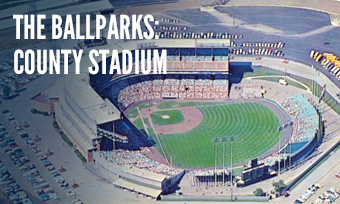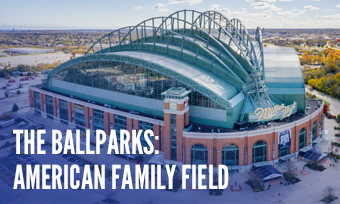THE TEAMS
Milwaukee Brewers
Known as the Seattle Pilots, 1969
THE BREWERS BY THE DECADE
The 1960s
The franchise began in 1969 as the one-year blunder known as the Seattle Pilots, who played in a slightly upgraded minor league ballpark that was nowhere near ready for prime time. One year, 98 losses, skimpy attendance and plenty of red ink later, the Pilots’ ownership wanted to sell; they avoided a lawsuit by declaring bankruptcy, selling to a group of investors (including future commissioner Bud Selig) which was able to gain clearance and bring baseball back to Milwaukee a week prior to the start of the 1970 season.
The 1970s
A change of scenery didn’t bring a change of results to the rechristened Brewers, suffering losing records in each of their first eight seasons; the brief, ceremonious return of an aging Hank Aaron to Milwaukee did little to bump up attendance that hadn’t been much of an improvement over Seattle’s gate. The Brewers’ luck turned overnight when the front office went through a major turnover for 1978, with the new regime building up an impressive core of offensive talent that included Robin Yount, Paul Molitor, Larry Hisle, Cecil Cooper and Gorman Thomas.
The 1980s
The Brewers completed a run of six straight winning seasons that led to two playoff appearances, including a 1982 postseason that gave the team, which had roared back to life as “Harvey’s Wallbangers” under new manager Harvey Kuenn after a weak start, its only league title to date. The Brewers slumped in mid-decade, reviving briefly in 1987 when they won their first 13 games—followed by a 12-game losing streak. Yount and Molitor, both chugging their way to 3,000 hits, continued to be the loyal glue of the team.
The 1990s
Hard times set in for the Brewers after the 1994-95 players’ strike, as the economic conditions of the times began to compound the franchise’s disadvantage of playing in one of the majors’ smallest markets; they weren’t awful, but they couldn’t contend, especially with pitching that was constantly among the worst within baseball. A sentimental chord was struck in 1998 when Selig, now the game’s commissioner, ‘returned’ Milwaukee to the National League 33 years after the Braves left Wisconsin for Atlanta.
The 2000s
The Brewers caught up with modern times by moving into their own revenue-generating ballpark, the retractable-roofed Miller Park—but initially, it did nothing to improve play on the field, underscored when it finished with a franchise-worst 56-106 record in their second year there. But hope was on the way; booming Prince Fielder became an instant presence by mid-decade, followed shortly by sharp-hitting Ryan Braun. With them, the Brewers ended a 15-year run without a winning season in 2007—and one season later, made the playoffs for the first time in 26 years.
The 2010s
The buzz from the end of the 2000s carried well into the new decade with occasional total gates of three million and, in 2011, the Brewers’ first divisional title since 1982. But the bubble of success popped with a strengthened division, the free-agent departure of Prince Fielder and admitted steroid use by Braun—who initially lied about it—casting a depressing pall over what little was left of the feel-good atmosphere. In its wake, the Brewers outlook improved with a young, fast and loose roster—and led to multiple postseason appearances to close out the decade behind perennial MVP contender Christian Yelich.
The 2020s
Winning times carried over into the new decade under the managerial guidance of Craig Counsell and later Pat Murphy, with ferocious pitching often bailing out an undisciplined yet still powerful batting lineup that was expected to be fronted by Yelich—given a giant contract in 2020 before oddly struggling to retain MVP form. Big crowds continued to eat it up, both inside and outside with plentiful bratwurst on the grills in the ballpark’s parking lots.
Highlights of the Brewers’ History on This Great Game:
 1982: Streaking Engagement In a year of roller coaster pennant races, series comebacks and nail-biting finishes, the St. Louis Cardinals get the last say with a come-from-behind World Series triumph over the high-powered Brewers.
1982: Streaking Engagement In a year of roller coaster pennant races, series comebacks and nail-biting finishes, the St. Louis Cardinals get the last say with a come-from-behind World Series triumph over the high-powered Brewers.





